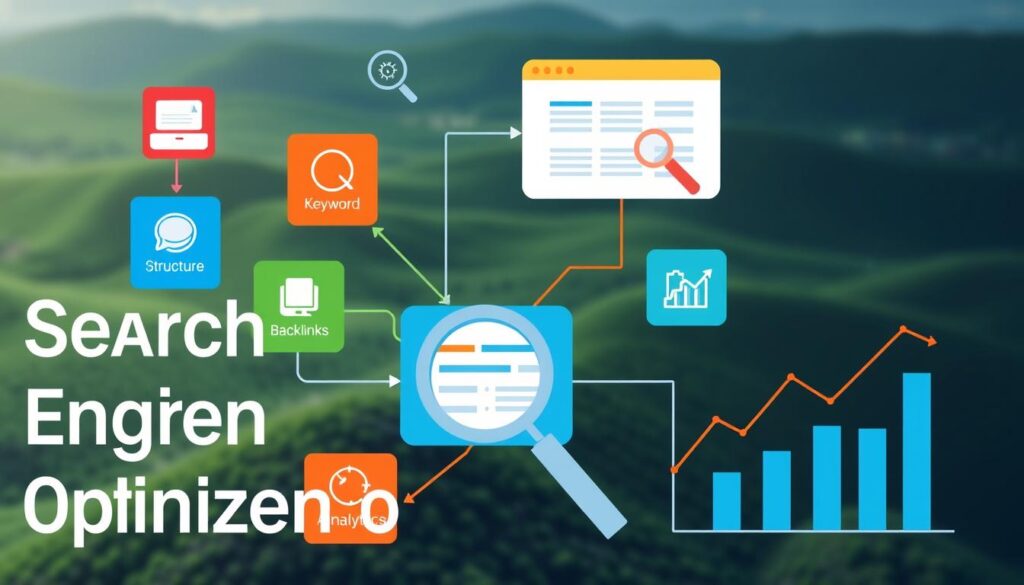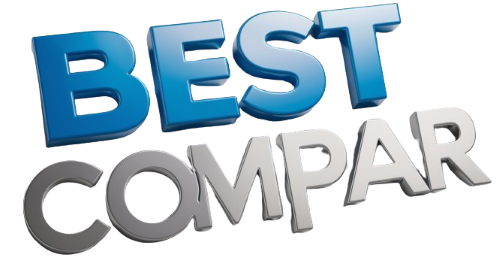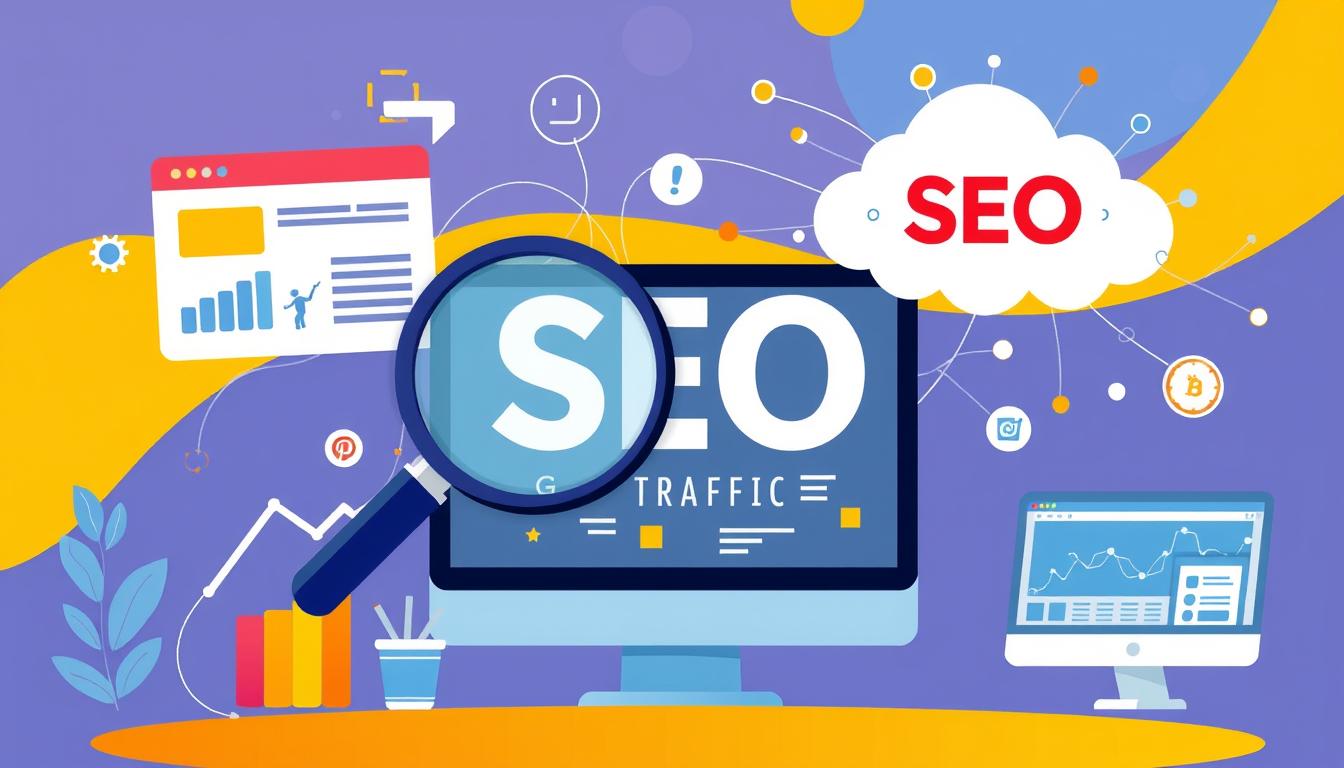SEO for Beginners: Essential Tips to Boost Your Online Presence
Search engine optimization (SEO) is your digital roadmap to online visibility. In today’s competitive digital landscape, understanding how to optimize your website is key. It can mean the difference between being discovered or remaining invisible to potential visitors.
Your website’s success depends on its ranking in search results. Google’s algorithm looks at over 200 ranking factors. This makes SEO a complex but crucial strategy for driving organic traffic and improving website ranking.
By following SEO best practices, search engines can better understand and index your content. This involves crafting descriptive URLs, minimizing duplicate content, and creating high-quality, relevant information. This information should meet user needs.
Table of Contents
Understanding Search Engine Optimization Fundamentals
Search engines guide us through the internet. Google is the biggest, with over 90% of searches. Knowing how they work is key for online success.

Web crawlers find and index online content. They automatically visit websites, gathering info for search engines. This helps them rank pages.
How Search Engines Discover Content
- Crawlers explore websites through internal and external links
- They analyze page content, metadata, and site structure
- Search algorithms evaluate hundreds of ranking factors
- Pages are indexed and ranked based on relevance and authority
Key SEO Terminology
To get good at SEO, you need to know some important terms:
| Term | Definition |
|---|---|
| SERP | Search Engine Results Page where web pages are displayed |
| Backlinks | External links pointing to your website from other sites |
| Indexing | Process of adding web pages to search engine databases |
“The art of SEO is understanding how search engines think and strategically presenting your content.” – Digital Marketing Expert
Search algorithms change a lot, with Google updating its algorithm up to 2,000 times a year. Keeping up with these changes is crucial for your website’s visibility.
Getting Started with SEO for Beginners
Starting your website’s journey to better search visibility is key. Google handles 4.9 billion searches every minute. This makes optimizing for organic search very important for success online.
To begin your website optimization, follow these important steps:
- Check your site’s indexing using the site: search operator
- Verify technical requirements for search engine accessibility
- Create a comprehensive sitemap of important URLs
- Develop a logical site structure
“Understanding search intent is the foundation of effective SEO strategy” – Digital Marketing Experts
Your main goal is to make your website easy to find and access. Focus on creating descriptive URLs and reducing duplicate content. This will help boost your organic search performance.
| SEO Focus Area | Key Action | Impact |
|---|---|---|
| Indexing | Submit sitemap to Google | Increases search visibility |
| Content Structure | Create logical site hierarchy | Improves crawlability |
| URL Optimization | Use clear, descriptive URLs | Enhances user experience |
Only 0.63% of users go to the second page of search results. By following these SEO basics, you’ll greatly increase your website’s chances of ranking higher. This will attract more organic traffic to your site.
Essential On-Page Optimization Techniques
On-page SEO is key to a good digital marketing plan. It makes your website better for search engines and brings in more visitors.
Mastering Title Tag Optimization
Your title tag is very important. Make titles that:
- Include primary keywords naturally
- Stay under 55 characters
- Accurately describe page content
- Entice users to click
“A well-crafted title tag is your first impression in search results” – SEO Experts
Crafting Effective Meta Descriptions
Meta tags help draw in visitors. They don’t directly affect rankings but can boost click-through rates.
| Meta Description Best Practices | Key Recommendations |
|---|---|
| Length | 150-160 characters |
| Keyword Integration | Include primary and secondary keywords naturally |
| Value Proposition | Clearly communicate page content benefit |
Leveraging Header Tags for Content Structure
Good header tags are vital for both users and search engines. They help:
- Create a logical content hierarchy
- Include relevant keywords
- Improve readability
- Guide search engine crawlers
Using these on-page SEO methods makes your content easier to find and use. Quality content and smart optimization lead to online success.
Mastering Keyword Research and Implementation
Keyword research is key to good search engine optimization. Knowing how to pick and use the right keywords can change your digital marketing. It can also bring more targeted visitors to your site.
When you start keyword research, look for long-tail keywords. These are longer phrases, usually 3-4 words, that match what your audience is searching for. They help you reach your potential customers more precisely.
“The art of keyword research is about understanding your audience’s language and needs.”
Your keyword research plan should cover several areas:
- Analyze search volume and competition levels
- Understand different types of search intent
- Use advanced keyword research tools
- Create topic clusters around core keywords
There are many tools for keyword research. Here’s a look at some of the best ones:
| Tool | Key Features | Best For |
|---|---|---|
| Google Keyword Planner | Free, integrated with Google Ads | Basic keyword research |
| SEMrush | Comprehensive competitor analysis | Advanced SEO strategies |
| AnswerThePublic | Question-based keyword suggestions | Content ideation |
Good keyword use is more than just adding keywords to your content. You want to make content that’s meaningful and focused on the user. It should naturally include strategic keywords and offer real value to your audience.
Creating Search-Engine Friendly Content
To make your content stand out online, you need a smart plan for content marketing and optimization. Search engines look for content that offers a great user experience. They also want content that shows you’re an expert, experienced, and trustworthy (E-E-A-T).
Content Quality Guidelines
Your content should give real value to readers. Here are some key strategies:
- Create original, comprehensive content
- Address user search intent directly
- Maintain high-quality writing standards
- Update content regularly to stay relevant
Writing for Users and Search Engines
It’s important to balance what users want with what search engines need. Use keywords in a natural way, focusing on easy reading and keeping people engaged. Remember, search engines reward content that genuinely helps users solve problems or answer questions.
“Content is king, but distribution is queen – and she wears the pants.” – Jonathan Perelman
Content Length and Structure
Longer content often ranks better in search results. Articles with 1,500+ words offer deeper insights and show you know your stuff. Use:
- Clear headings
- Short paragraphs
- Bullet points
- Relevant examples
Optimizing your content is an ongoing task. Use tools like Google Keyword Planner and check how your content is doing. This will help you keep improving your strategy.
Building a Strong Site Architecture
Creating a strong website structure is key for both search engines and users. It makes it easy for visitors and search engines to find and understand your content. A well-organized site helps with indexing, reduces user frustration, and boosts SEO.
Effective site navigation starts with a plan. Here are some important steps for a great website structure:
- Maintain a flat site architecture with pages accessible within 3-4 clicks
- Create logical URL structures that reflect content hierarchy
- Group topically related content into clear categories
- Implement clear internal linking strategies
Internal linking is vital for site architecture. It helps search engines see how your content is related. Strategic internal links also help distribute page authority and guide users.
“A well-structured website is like a well-organized library – everything has its place and can be easily found.”
Your URL structure should be easy to understand. Use URLs like www.yoursite.com/category/subcategory/page-title instead of random numbers. This makes it easier for users and search engines to know what each page is about.
| Architecture Type | User Accessibility | SEO Impact |
|---|---|---|
| Flat Architecture | Easy navigation | High crawlability |
| Deep Architecture | Complex navigation | Reduced indexing |
Your website’s structure affects user engagement and search engine rankings. Focus on clear, logical organization. This helps users find what they need easily and gives search engines a clear path to follow.
Technical SEO Essentials
Technical SEO is key to your website’s success in search engines. It helps your site get crawled and seen in search results. Knowing and using important technical strategies can make a big difference.
Mobile Optimization and Mobile-First Indexing
Google now looks at your mobile site first. This means your mobile version is more important for ranking. Making sure your site works well on mobile is now a must for good SEO.
- Design responsive layouts that adapt to different screen sizes
- Optimize touch elements and readable fonts
- Minimize page load times on mobile devices
Site Speed Optimization Techniques
How fast your site loads affects both users and search engines. Faster sites are crawled better and rank higher in search results.
| Optimization Strategy | Impact |
|---|---|
| Image Compression | Reduces file sizes, improves load times |
| Browser Caching | Speeds up repeat visitor experience |
| Minify CSS/JavaScript | Reduces code complexity |
XML Sitemaps and Robots.txt Management
Setting up XML sitemaps and robots.txt files helps search engines understand your site better. They make it easier for crawlers to find and index your content.
A well-structured sitemap is like a roadmap for search engine crawlers, guiding them through your website’s most important content.
- Create comprehensive XML sitemaps
- Use robots.txt to guide crawler behavior
- Regularly update and submit sitemaps to Google Search Console
Off-Page SEO Strategies
Off-page SEO is a key part of your digital marketing plan. It goes beyond just optimizing your website. It helps improve your online image and search rankings.
Link building is a strong way to boost your site’s authority. A 2020 study showed that more backlinks mean better Google rankings. But, it’s not just about how many links you have. It’s about getting links from trusted sites in your field.
- Develop research-backed content that attracts high-quality backlinks
- Create engaging videos for YouTube to increase brand visibility
- Participate in industry forums and discussions
- Manage social signals across different platforms
“Off-page SEO carries about 50% of the ranking factor weight” – Moz Study
Brand mentions are important for off-page SEO. They can help your brand’s online presence even without direct links. Google looks at inbound links when ranking pages.
Social signals from sites like Twitter, LinkedIn, and Facebook can also affect your search engine ranking. By getting more people talking about your brand online, you boost your visibility.
Link building is about knowing the different types of links:
- Natural links from content appreciation
- Manually-built links through outreach
- Self-created links from directories and profiles
Getting dofollow backlinks from high-authority sites can make your site more trustworthy. Your off-page SEO plan should aim to build a strong online reputation.
Local SEO Best Practices
Local search is key for businesses aiming at specific areas. With 46% of Google searches looking for local info, knowing local SEO boosts your online presence. It also draws in customers nearby.
To succeed in local digital marketing, you need a solid plan. This plan uses various platforms and methods. The aim is to make it easy for people to find your business when they search for what you offer in your area.
Google Business Profile Optimization
Your Google Business Profile is a vital tool for local search. An active profile can boost your rankings and draw in more customers. Key strategies include:
- Ensure accurate NAP (Name, Address, Phone) information
- Add high-quality business photos
- Update business hours regularly
- Create engaging posts about services or promotions
Local Citation Building
Local citations are key for your business’s online trustworthiness. Having the same NAP info everywhere helps search engines confirm your business’s realness.
| Citation Platform | Importance | Verification Method |
|---|---|---|
| Google Business Profile | High | Verified Phone/Postcard |
| Yelp | Medium | Email Verification |
| Yellow Pages | Medium | Phone Verification |
Review Management
Customer reviews are crucial for local search rankings. 76% of consumers searching locally on mobile visit a store the same day. Good review management strategies include:
- Encourage happy customers to leave reviews
- Respond quickly to all reviews
- Address negative feedback well
- Use tools to track reviews
“Local SEO is not just about visibility, it’s about building trust with your community.” – Digital Marketing Expert
Essential SEO Tools and Resources
SEO is complex, needing strong SEO software and analytics tools. Digital marketers and website owners use many resources to improve their online presence. They also track their performance well.
“The right SEO tools can transform your digital strategy from guesswork to precision.” – SEO Expert
Choosing the right keyword research tools is crucial. Here are some key tools to help improve your website’s search engine rankings:
- Google Search Console: Free tool for monitoring website performance
- Google Analytics: Comprehensive website traffic and user behavior insights
- SEMrush: All-in-one SEO software for competitive analysis
- Ahrefs: Advanced rank tracking and keyword research platform
- Ubersuggest: Budget-friendly keyword research tool
When picking SEO tools, think about what you need and your budget. Some tools have free versions with basic features. Others offer full packages for more advanced optimization.
| Tool | Primary Function | Price Range |
|---|---|---|
| Google Keyword Planner | Keyword Research | Free |
| SEMrush | Comprehensive SEO Analysis | $119.95 – $449.95/month |
| Ahrefs | Rank Tracking | $99 – $999/month |
Don’t rely on just one tool for SEO. Using many analytics tools and keeping up with trends is essential for SEO success.
Conclusion
SEO is a journey that needs constant effort and smart planning. Your success online depends on a strong SEO plan that keeps up with search engine changes. Remember, getting better rankings takes time and steady work.
Keeping your SEO game strong is essential. Google looks at websites in many ways, like how well they match searches and how users feel about them. By making great content, keeping your site in top shape, and knowing what users want, you’ll get noticed online.
Use tools like Google Search Console and Google Analytics to see how you’re doing. These tools give you important info on your site’s performance. Aim for a mix of technical tweaks and content that people love.
As search tech gets better, knowing the latest SEO tips is key. Keep learning, be open to new ideas, and see SEO as a journey of getting better. With hard work and smart planning, you can boost your online presence and connect with your audience better.








